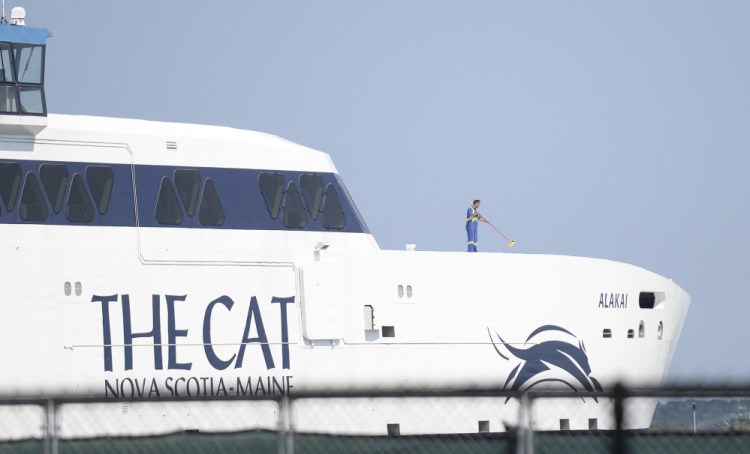The Nova Scotia-to-Maine ferry could avoid paying certain fees to harbor pilots in Portland and Bar Harbor under a bill proposed by a Portland-area lawmaker.
Some large vessels, like ferries and container ships, are required to hire local captains to pilot ships safely into harbor. But under L.D. 1752, sponsored by Sen. Mark Dion, D-Portland, U.S.-flagged ferries would not have to use a pilot after taking 15 pilot-assisted trips. Foreign-flagged ferries would not need local help after completing a number of pilot-assisted trips set by oversight boards.
Prince Edward Island-based Bay Ferries, which operates The Cat, a seasonal high-speed ferry between Portland and Yarmouth, Nova Scotia, would be the prime beneficiary if the bill becomes law. The company is in the middle of litigation with Portland Pilots, a trade association representing local captains, and the Portland Board of Harbor Commissioners over a minimum fee increase from $709 to $1,077 per trip approved by commissioners last year. Bay Ferries claims the process behind the rate increase was flawed and the increase is too expensive.
The bill’s passage would revive an exemption that existed for decades before 2012, allowing ferry operators to forgo local pilots, according to supporters. But opponents, including Portland Pilots Inc. and the Portland Board of Harbor Commissioners, say changing the rules will erode government oversight and create safety issues.
For almost 50 years, the ferry operated between Canada and ports in Bar Harbor and Portland under minimum pilot supervision without a problem, said Harold Pachios, who represents Bay Ferries as a partner with the Preti, Flaherty, Belliveau and Pachios law firm in Portland. The rule changed only after the ferry briefly stopped running between 2010 and 2014, when there was no one to oppose changes to pilotage requirements, he added.
“This proposed law restores the decades-long language word-for-word, except it makes it a little more stringent,” Pachios said. Bay Ferries knew the law had changed when it started The Cat service in 2016, but last year’s fee hike “just crystallized the concern,” he added.
While harbor commissioners argue the law would strip them of direct oversight, the bill actually gives them control over how many ferry trips require a pilot, Pachios said.
“Theoretically, they could pass a rule under this authority that would require a foreign ferry to take a pilot on every trip,” he said.
Opponents of the bill say allowing large ships into port without experienced local guides threatens safety and the environment.
Pilots in Portland Harbor have to have 250 trips operating in all types of weather, experience ship captains cannot replicate, said Twain Braden, an attorney with Thompson, Bowie and Hatch who represents Portland Pilots Inc. and the Penobscot Bay and River Pilots Association. Going back to looser pilot requirements would open a dangerous loophole, even though ferries were allowed to navigate Maine waters for decades with minimal assistance, he added.
“It is a recipe for disaster; it is hard to overstate,” Braden said. “For the Legislature to think because nothing happened in the past and we got lucky is totally naive.”
HEARING IN AUGUSTA
Portland Pilots’ revenues have dropped precipitously as oil tanker traffic has declined in recent years, which was the reason for the minimum fee increase, Braden said.
The Maine Pilotage Commission and Portland Board of Harbor Commissioners are both opposed to the legislation.
Tom Dobbins, chairman of the Portland board, said giving ferries an exemption would erode local oversight. The board sets training and licensing requirements for pilots and can investigate or discipline them in the event of an incident, something it would not be able to do to a foreign captain.
“If they have an accident we can pull a pilot’s license; we would not have that ability under this legislation,” Dobbins said. “A pilot licensed by the commission is a neutral witness; he doesn’t work for the ship owners.”
The Legislature’s Transportation Committee will hold a public hearing on the bill Thursday afternoon. Rep. James Gillway, R-Searsport, who sat on the committee when the ferry exemption was closed in 2012, said discussion at the time was focused on safety and security. The Costa Concordia disaster, when a cruise liner capsized off the Italian coast, killing 32 people, occurred around the time the bill was debated.
“It is that extra level of safety and security that the ports and people who live in the ports deserve,” Gillway said. “I’m not interested in going backwards.”
Send questions/comments to the editors.




Success. Please wait for the page to reload. If the page does not reload within 5 seconds, please refresh the page.
Enter your email and password to access comments.
Hi, to comment on stories you must . This profile is in addition to your subscription and website login.
Already have a commenting profile? .
Invalid username/password.
Please check your email to confirm and complete your registration.
Only subscribers are eligible to post comments. Please subscribe or login first for digital access. Here’s why.
Use the form below to reset your password. When you've submitted your account email, we will send an email with a reset code.